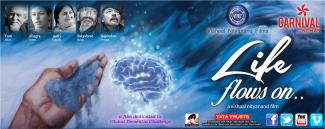
Vishaal Nityanand, a young filmmaker, ploughed his own money and full commitment to make Life Flows On, a movie on people with dementia and their caregivers, in order to raise awareness and understanding about the condition that he feels is callously neglected and overlooked in India. Read his interview.
You have written and directed the film ‘Life Flows On’ that is dedicated to people with dementia and caregivers. Could you tell us a little about it?
Life Flows On deals with three dementia patients and how their paths cross. The story flows with the psychological and emotional processes of a young woman whose mother has Alzheimer’s disease. She is part of an Anglo-Indian family living in Landour, a small cantonment town in the Himalayan Valley, a place they all love. Her struggle starts when her mother’s suffering becomes severe and there is no active support, not even basic infrastructure, to deal with this challenge. The story also connects with the Global Dementia Challenge, where around 45 million people suffer from the disease. The film focuses on how we can respond to this challenge, individually and as a society.
The theme of Life Flows On is rather offbeat. What inspired you to make the film?
It was while doing research for our feature film projects and documentaries based on health challenges in India that we came across the alarming prevalence of dementia and the poor treatment of dementia. Maybe because dementia is largely related to the elderly population, nobody really seemed concerned; despite there being around 4 million people today suffering from Alzheimer’s alone, according to 2010 census. When we approached the concerned departments working for the Elderly or Alzheimer’s Care in the country, we found their response was quite shocking. One gentleman working in the Government sector said, “Why should we waste our resources on non-productive people? Our priorities are different.” His callousness and cold reaction fired me to make this film.
How serious is the dementia problem in India? What needs to be done about it?
Dementia is actually a growing epidemic in our country, but unfortunately our system is treating it very casually. The Elderly Health Care is grossly neglected sector in our country. Those working on dementia in India are not working in a comprehensive manner and their reach at the ground level is almost zero. We found that few organizations working in this space are concerned only with part of the Dementia Challenge. Their projects too deal more with websites and social media that gives them publicity. Of course, there are a few exceptions. But overall, there is a dire need to raise more awareness and concern.
What are the best practices for communication and caring for people with dementia that has been portrayed in your film?
We have not made this film to preach any practice or technique to deal with dementia but we have tried to portray dementia the disease and how best we can respond to this challenge as caregivers, individuals and communities. For example, we have tried to emphasise the need for more centres for caregiving, we have focussed on individuals who are working with great commitment, how we can use alternative media tools like community radio to raise positive awareness and connect with other larger communities.
The journey for dementia caregivers can also be quite stressful. Has your film been able to focus on some of their stress and anxiety?
Yes actually, a caregiver’s journey is more stressful and complex while dealing with Dementia Patients… and we have shown that in our film. We have shown how our protagonist deals with her mother’s worsening Alzheimer. One of the objectives of the film is to show how families or caregivers dealing with a complex health challenge do not lose faith in life. For them ‘Life Flows On’, and each day, despite all pain and difficulties, they put their best foot forward. And it is this we should support and respect.
There is a lot of confusion surrounding dementia. What are some of the common misconceptions that you have dealt with in your film?
The most dangerous and common confusion dealing with Dementia Challenge is that it can cured with alternative medical practice. Secondly, there is a lot of social activism prevalent without having clarity about medical aspect of the disease. Like there are different types of Dementia such as Alzheimer’s, Lewy Body Dementia and so on. Everything is not Alzheimer’s.
What was the biggest challenge you faced making this film?
I think the biggest challenge was raising resources for this film. Finally, my friends and I ploughed in our own money. Once the film was made, everyone appreciated it. We had a great cast and crew from India and Europe.
What is the most important lesson that you have learnt about dementia from your film?
That we should respect individuals who are sensitive and caring; who do sometimes lose faith; who care for their families when most in need.
What message does Life Flows On have for the audience?
That no matter what situation we are in, there is Life and Life Flows On. We should respect that flow.
Do have any favourite film that depicts a disease or disorder sensitively and can be recommended for viewing?
Recently I saw a film on Alzheimer’s called ‘Still Alice’ that touched me deeply.







